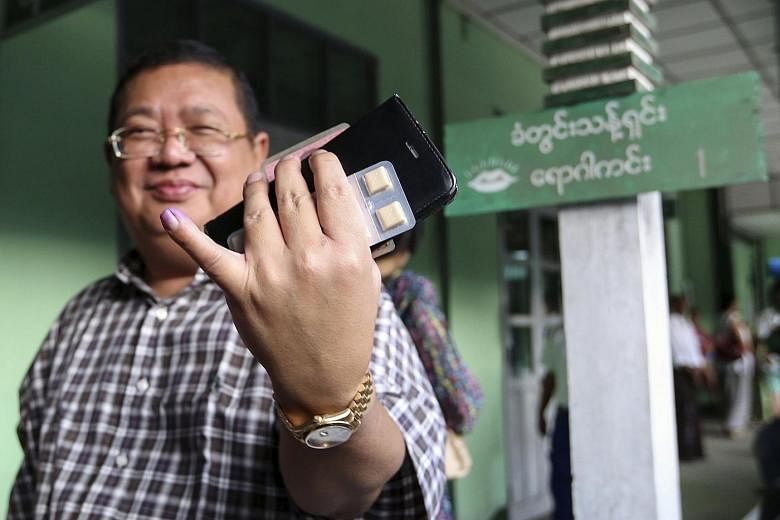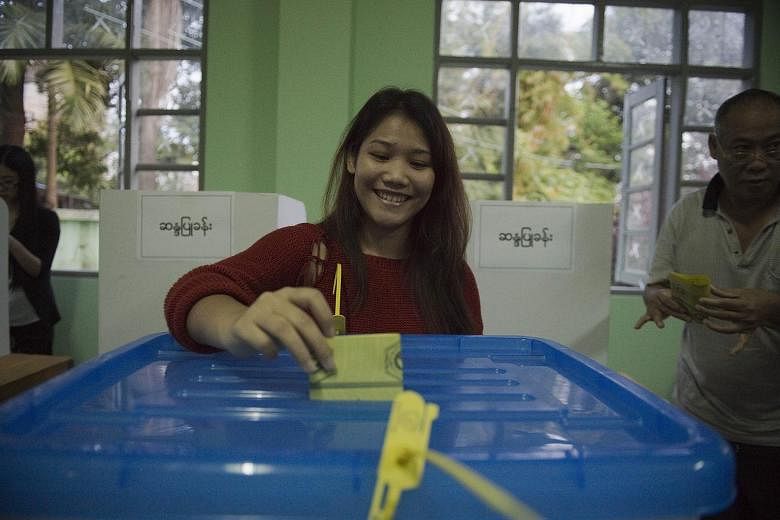YANGON (BLOOMBERG, AFP) - Voting began on Sunday (Nov 8) in Myanmar's first free nationwide election in quarter of a century, after a campaign that was marred by concerns about irregularities and religious tensions.
"Polls have opened," a Union Election Commission official told AFP, requesting anonymity, at Bahan Township in Yangon, where Nobel Peace Prize-winner Aung San Suu Kyi, whose opposition National League for Democracy party is expected to win the most votes, is due to cast her ballot.
More than 30 million Myanmar citizens are eligible to vote in the nation's most important election in 25 years.
What comes next will test the military's willingness to share power and determine the pace of economic and political reforms.
Suu Kyi will cast her ballot about 7 am (9.30am Singapore time), the party said.
Initial results aren't expected for several days and a complete count may take weeks, according to the election commission.
President Thein Sein said Friday that the military and the government will accept the outcome of the election, and he'll work with opposition parties to ensure a stable transition.
The vote comes 25 years after the junta ignored a landslide victory by Suu Kyi's NLD, eight years after it violently crushed pro- democracy protests, and five years after it handed power to its political arm in a vote tainted by allegations of fraud.
"These elections will be an important milestone in Myanmar's transition to democracy, and the responsibility for their success rests with the government, political parties, civil society, the media, and most importantly, the people of this country, charting a peaceful, just, and united way forward together," a group of 12 countries and the United Nations wrote in a joint statement Friday.
Though more than 90 parties are competing to represent the Southeast Asian nation's 52 million people in parliament, the vote boils down to two key choices: Suu Kyi's party and its mantra of change, or Thein Sein's military-backed party and its promise of stability. Should neither win a majority, ethnic parties which are expected to do well in border areas might determine who leads the next government.
Since taking power in 2011, Thein Sein's quasi-civilian government opened industries such as energy exploration, banking and telecommunications to foreign participation in a bid to bring Myanmar out of more than 50 years of economic isolation.
Annual economic growth has averaged more than 7 per cent since the 2010 election, helped by foreign investment in infrastructure and low-cost manufacturing.
The NLD is banking on Suu Kyi's personal popularity to sweep the party to power, though even if it wins she's barred from the presidency because her children hold foreign passports.
No matter who wins, the military will maintain a key role in politics because it is guaranteed 25 per cent of seats in parliament as well as control of key ministries.
Suu Kyi has repeatedly said she plans to lead the government should her party win, a stance that risks antagonizing the military.
"I will be above the president," she said Nov 5 at her home in Yangon, where she spent a total of 15 years under house arrest, ending in November 2010.
"The constitution says nothing about someone being above the president."
Suu Kyi, 70, has already raised concerns about how fair the vote will be, alleging that the election commission has failed to investigate complaints about campaign violations and possible irregularities in advance voting.
The party will consider contesting the results if they deem them fraudulent, she said.
The election commission has acknowledged that errors on the voter registration lists are widespread, and will only guarantee that the lists are 30 per cent accurate.
Combined with an earlier purging of many Muslims from the voter rolls, that means millions of people could potentially be disenfranchised.
The US is "focused on ensuring that the conduct and outcome of the elections are as credible, transparent, and as inclusive as possible," State Department spokesman John Kirby said in a briefing in Washington on Nov 5, and "will continue to emphasize the importance that key Burmese political institutions respect the outcome of that process."







